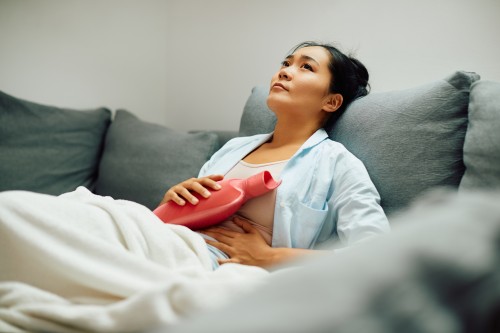
Categories: Women's Health
07 September 2023
Endometriosis, can a naturopath help?
Endometriosis is a multi faceted disease affecting approximately one in every ten women.
It often remains undiagnosed for a span of 7-12 years. Mainly due to the fact that numerous women consider menstrual pain to be a regular occurrence and therefore don't frequently seek assistance. As a result, they endure excruciating periods, intense bleeding, and ovulation discomfort. Often, they only become aware of an underlying issue, often related to fertility struggles, much later.
In this article, I delve into the topic of endometriosis—explaining its nature, symptoms, touching briefly on treatment possibilities, discussing how naturopathy can be beneficial, and presenting 4 actionable steps to initiate right away.
What is Endometriosis?
Endometriosis stands as a chronic, systemic and inflammatory gynaecological disease in which tissue similar to the uterine lining grows outside the usual confines. These alternate sites of growth encompass the pelvic region, ovaries, bladder, bowel, and in some cases, even the lungs and brain of certain women.
Similar to the endometrial tissue within the uterus, this tissue thickens, breaks down, and bleeds during each menstrual cycle. However, in contrast to the regular menstrual discharge, this tissue becomes entrapped due to the absence of a natural exit pathway. Consequently, inflammation arises within the surrounding tissues and organs, fostering the creation of scar tissue and adhesions. This situation can lead to complexities as the adhering of tissues and organs to one another triggers persistent and enduring chronic pain. Roughly 10% of women contend with endometriosis.
What are the symptoms of Endometriosis?
Those affected may suffer with many different symptoms not just typically pelvic pain, which is one of the reasons why diagnosis can take years.
Some of the other symptoms associated with endometriosis can be:
- Menstrual pain
- Pain during sexual intercourse
- Discomfort during bowel movements
- Ovulation pain
- Gastrointestinal disturbances
- Persistent constipation
- Ongoing diarrhea
- Bowel bleeding
- Continual abdominal pain
- Pronounced bloating (often referred to as "endo belly")
- Chronic bloating
- Aching in the ovaries
- Symptoms akin to Irritable Bowel Syndrome (IBS)
- Frequent migraines and headaches
- UTI-like symptoms without any infection
- Prolonged pelvic pain
- Sensation of pelvic and rectal pressure
- Musculoskeletal discomfort
- Persistent nerve pain
- Retention of bodily fluids
- Iron deficiency
- Fluctuations in mood, including mood swings
- Anxiety
- Depression
- Mood disorders
- Infertility
Endometriosis can also be asymptomatic meaning that some women don’t experience any pain at all. Pain levels are not indicative of the severity either. Some women have minimal endometriosis and excruciating pain and some women have a lot of endo and minimal pain.
Exploring the Conventional Treatment Approaches:
When women with endometriosis consult healthcare professionals, they are presented with a variety of options for managing their condition. These options include using over-the-counter pain relievers like ibuprofen, adopting birth control methods, considering intrauterine devices (IUDs), taking medications such as Lupron or Orilissa that trigger temporary menopause (though these medications often come with notable side effects), and utilizing localized pain-relief solutions like lidocaine.
These options differ in terms of how effective they are and the risks associated with them. Surgery is often regarded as one of the best treatments, with a notable mention going to excision surgery carried out by an advanced trained laparoscopic excision specialists. It's important to clarify that a hysterectomy is not a suitable treatment for endometriosis since the condition involves tissue outside the uterus. However, in cases where coexisting adenomyosis is present (a condition frequently accompanying endometriosis), a hysterectomy might offer benefits.
Tackling endometriosis using conventional methods is a multifaceted challenge. On a positive note, holistic approaches have emerged as promising alternatives to symptom-relief medications. These holistic methods are characterized by their non-invasive nature and minimal side effects, showing great results.
Can a naturopath help with Endometriosis?
Sure can!
Naturopathy is a comprehensive and multidisciplinary form of complementary medicine that combines various clinical approaches to address an individual's health. These approaches, I use, encompass nutrition, herbal medicines, nutritional supplementation, lifestyle modifications, as well as a team approach with other practitioners that can also support a woman with their endometriosis. Such as pelvic physiotherapists etc.
The good news is, because Naturopathy is rooted in the principle of "treating the whole person," it can serve as a valuable complementary therapy alongside medical and surgical interventions for Endometriosis or to alleviate the diverse range of symptoms associated with the condition.
Naturopathy can provide support in the following areas:
- Reduction of inflammation and pain, a prevalent feature among individuals with endometriosis.
- Promotion of detoxification, facilitating a reduction in inflammation while concurrently diminishing circulating estrogen levels .
- Addressing gut dysbiosis and gut wall integrity to balance hormones, mood, inflammation.
Gut dysbiosis and endometriosis refers to the potential connection between imbalances in the gut microbiota (the collection of microorganisms living in the digestive tract) and the development or progression of endometriosis. Research suggests that disruptions in the gut microbiome could play a role in the inflammatory and immune processes associated with endometriosis.
The gut microbiome is a complex ecosystem of bacteria, viruses, fungi, and other microorganisms that interact with each other and with the human body. It plays a crucial role in maintaining overall health, influencing digestion, metabolism, immune function, and even mental health. Imbalances in the gut microbiota, known as dysbiosis, have been linked to various health conditions, including autoimmune diseases and chronic inflammatory disorders.
- Reducing toxic load in the body.
The body has natural detoxification pathways that help eliminate toxins, but in some cases, these pathways can become overwhelmed by high toxin exposure. This can potentially lead to the accumulation of toxins in the body, referred to as a "toxic load." Some experts suggest that a high toxic load may contribute to the inflammation and oxidative stress that are often associated with endometriosis.
4 ways to help endometriosis naturally:
Here are 4 ways to get started with managing endometriosis naturally. Note: There are many more ways which we delve deeper into when we work together. These are 4 simple ways you can action right now.
-
Up your Omega 3 fatty acids
Research indicates that both consuming fish regularly and using supplements with omega-3 fatty acids can help reduce and regulate the inflammation linked to menstrual pain. Aim for a minimum of 3 servings of oily fish each week or consider a high-quality fish oil supplement.
Tip: Opt for smaller fish varieties as they contain more anti-inflammatory components. Think Salmon, Sardines, Mackerel, and Herring.
-
Infuse your kitchen routine with Turmeric.
Is there anything Turmeric can't do? Besides adding colour to your dishes and smoothies, turmeric is renowned for its potent anti-inflammatory properties. Including easing menstrual pain, inhibiting the growth of endometrial tissue, and enhancing gut microflora. Aim for 100g of fresh Turmeric or 2 tablespoons of powder in juices or stir-fries.
Tip: Turmeric's absorption is famously limited, but it can be improved by pairing it with fats (like oil) and black pepper. Enjoy your Turmeric with a meal containing healthy fats and a dash of black pepper to maximize its benefits.
-
Pause dairy and embrace Dairy-Free
From a natural health perspective, Dairy can sometimes trigger or worsen inflammatory conditions like endometriosis. Adopting a dairy-free diet can significantly alleviate symptoms related to irritable bowel syndrome (IBS), often part of the endometriosis landscape.
Tip: Replace cow's milk with options like coconut or almond milk – they taste delicious and offer valuable trace minerals. Worried about calcium? No need – almonds are a rich source of calcium.
-
Get creative with cruciferous vegetables
Sure, you might not be a fan of broccoli, cauliflower, cabbage, and Brussels sprouts, but these cruciferous veggies are nutritional powerhouses. They aid in eliminating excess estrogen from the liver – a crucial factor if you're dealing with endometriosis.
Moreover, they promote a healthy balance of gut microflora, provide valuable fibre and boast an abundance of antioxidants. Make it a goal to include at least one cup of cruciferous vegetables in your daily meals.
As you can see, endometriosis can present in many different ways for women. Good news is that there is a lot that can be done with naturopathy to set up a longer term plan to manage symptoms, pain, inflammation, the immune system and hormones.
If you are suffering from any of the symptoms mentioned above then reach out, we can have a discussion and get you on track to reducing your symptoms as well as putting a longer term plan in place to manage your endometriosis.



